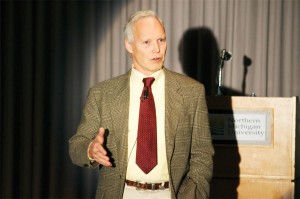
“My only memories of my father are of the man dying from smoking.” The words of Patrick Reynolds, son of R.J. Reynolds, founder of the second largest tobacco company in the U.S., resonate.
He spoke on campus Tuesday, April 8, and praised NMU’s new tobacco-free policy.
In the fall, NMU will join 24 other colleges or universities in Michigan, and more than 1,159 in the nation, as a smoke- or tobacco-free campus.
“It will protect the health of non-smokers from secondhand smoke and it will also incentivize smokers to quit.” Reynolds said. “It will save lives.”
Reynolds supports a “trifecta” of policies that are credited with lowering smoking rates by 50 percent in the last 50 years, he said.
“I vowed that I would do everything in my power to keep young people from starting to smoke and to use my platform as a Reynolds to shine the media spotlight on advocating smoking bans, tobacco tax increases and state spending on tobacco prevention and cessation,” Reynolds said.
But not everyone on campus is happy about the new policy. The campus survey revealed a 6 to 4 ratio in favor of the ban, leaving 40 percent of campus opposed.
Senior English secondary education major Abbey Carros said while she smokes, her opposition to the ban is based mostly on principle.
“I don’t think the university has the right to say what we can and can’t do with our bodies, as long as smokers respect the rules, like not smoking by the doors and not littering,” she said.
But Barb Coleman, health and human performance professor and a member of the implementation committee, responded to that criticism.
“People have the right to breathe clean air,” she said.
The university is taking every step possible to make it a healthier environment for the people of the NMU community, she said.
“Administration, faculty, staff and particularly students, because I think that’s what we want for all our students, is a healthy place to live, work and study,” she said.
Junior health and fitness management major Alex Kerlin, chairwoman of the NMU Health Promotion Society, helped bring Patrick Reynolds to campus, has helped work on the implementation process and said she feels people are excited to see this happen.
“I know there were some people that were a little upset, but for me, honestly, I think it’s great because it’s creating such a favorable environment for a healthier community,” she said. “And Marquette is a really health-oriented community. It makes sense that we’re providing this tobacco-free campus and trying to help people create a healthier environment and lifestyle.”
John LaPine, an NMU English graduate who will return in the fall for his MFA in English, is asthmatic from the years his mother smoked while he was young, but said he doesn’t think the ban is fair.
“My asthma is connected to smoking, but as far as people smoking on campus, I’m not too affected by it,” he said. “I don’t think it affects anybody.”
LaPine said he thinks the 30-foot rule is sufficient, even if people don’t follow it too closely.
“I don’t think banning [tobacco] on campus is going to stop people from smoking,” he said. “They’ll just have to walk farther to do it. I don’t think it’s going to change anyone’s mind. I don’t think it’s going to change anyone’s attitude.”
LaPine did say, however, that he does not condone smoking. “Personally I’m not a smoker, and I’m against smoking, but if people choose to smoke, I don’t see why it should be banned from campus,” he said. “I think that’s an overreaction.”
As part of the implementation process, smoking cessation workshops have been held throughout the semester. The last one for students will take place at 6 p.m., Friday, April 18, at the NMU Health Center. The cessation workshop for NMU employees will take place at 5 p.m. Thursday, April 17.
More than 400,000 people per year die from smoking in the United States and on average, smokers die 10 years earlier than non-smokers. Tobacco use leads to cancer, heart disease, stroke, lung diseases (including emphysema, bronchitis, and chronic airway obstruction) and diabetes, according to the Centers for Disease Control.
























